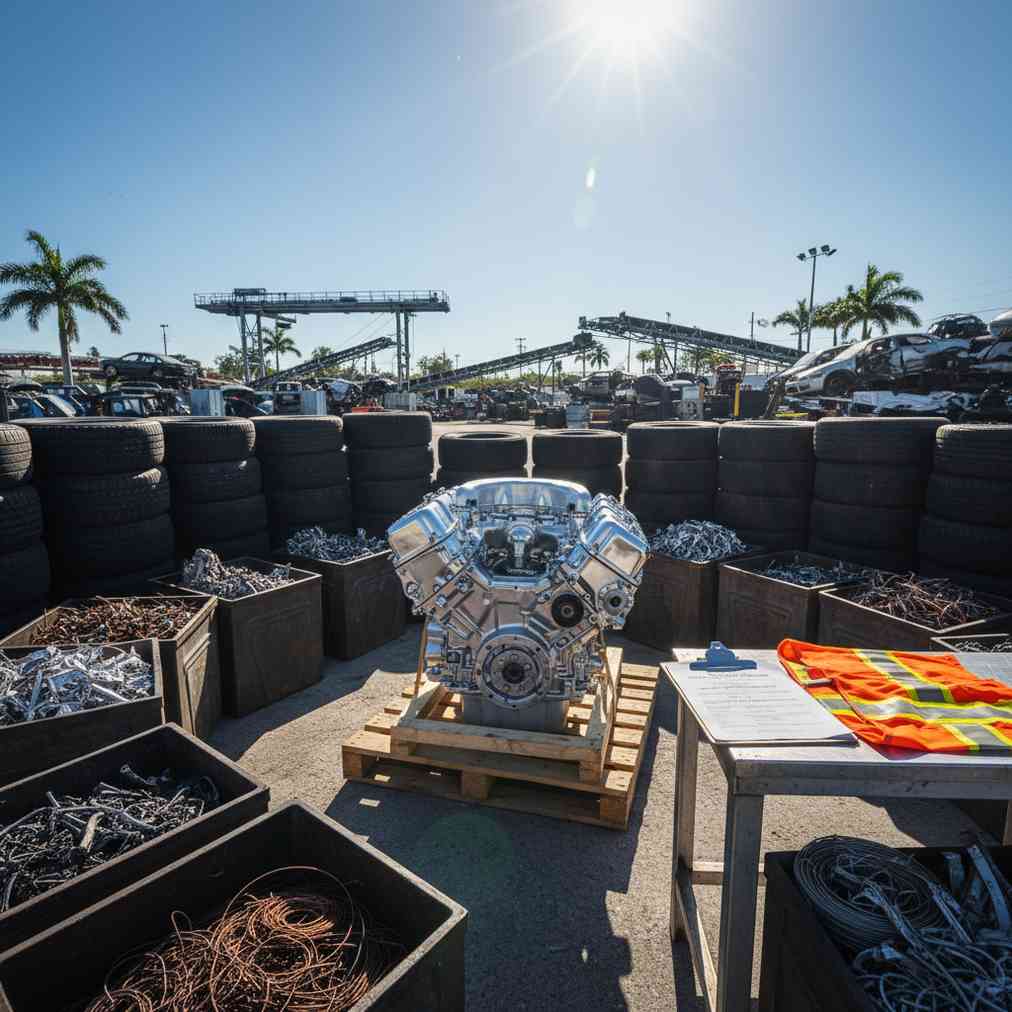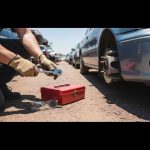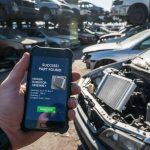Understanding Florida State Laws for Junk Vehicle Disposal
When disposing of a junk car in South Florida, understanding the legal requirements is crucial to avoid potential fines and liability issues. The Florida Department of Highway Safety and Motor Vehicles (FLHSMV) oversees the primary regulations governing vehicle disposal throughout the state, including Miami-Dade, Broward, and Palm Beach counties.
Title Transfer and Certificate Requirements
The most critical step in legally disposing of a junk vehicle in Florida involves proper title cancellation and transfer. According to Florida DMV regulations, vehicle owners must complete specific documentation to transfer ownership to licensed salvage dealers or recyclers.
- Original Title Required: Owners must provide the certificate of title and sign the “Transfer of Title by Seller” section
- Missing Title Process: Complete Form HSMV 82101 to obtain a duplicate title before proceeding with disposal
- Notice of Sale Filing: Submit Form HSMV 82050 to remove liability and update registration status
- License Plate Surrender: Remove and surrender plates to local tax collector offices or by mail
For those looking to get cash for cars quickly, understanding these requirements ensures a smooth transaction with licensed buyers who can handle the proper documentation.
Local Municipal Regulations in South Florida Counties
While state laws govern title transfers, local county and city ordinances in South Florida establish specific rules regarding abandoned vehicles and property storage. Each municipality has unique regulations that property owners must follow.
| County | Key Regulations | Enforcement Agency |
|---|---|---|
| Miami-Dade | 72-hour abandonment rule, no curbside vehicle disposal | Code Enforcement |
| Broward | Licensed plate required, private property restrictions | Municipal Services |
| Palm Beach | Environmental compliance, salvage yard setbacks | Environmental Control |
Abandoned Vehicle Classifications
South Florida municipalities often define vehicles as abandoned or junk based on specific criteria. Understanding these definitions helps property owners avoid code violations and potential fines.
- Absence of current license plates or registration
- Visible damage making the vehicle inoperable
- Storage on public property for extended periods
- Missing essential parts like engines or transmissions
Many residents search for junkyards near me to quickly dispose of vehicles before they violate local abandonment ordinances.
Environmental Compliance and Hazardous Material Disposal
The Florida Department of Environmental Protection (FDEP) enforces strict environmental regulations for junk car disposal throughout South Florida. These rules protect the region’s sensitive ecosystems, including the Everglades and coastal areas.
Mandatory Fluid Removal and Recycling
Licensed salvage yards must follow Florida’s auto recycling guidelines for proper handling of hazardous materials before vehicle dismantling or scrapping.
- Engine Oil and Transmission Fluid: Must be drained and recycled through certified facilities
- Coolant and Antifreeze: Requires specialized disposal to prevent groundwater contamination
- Battery Acid: Lead-acid batteries need separate recycling protocols
- Gasoline and Diesel: Fuel removal prevents fire hazards and environmental damage
- Air Conditioning Refrigerants: EPA-certified technicians must recover these substances
“Choosing a buyer who is a certified recycler ensures adherence to Florida’s environmental regulations for safe disposal of hazardous materials and helps protect South Florida’s unique ecosystem.”
Derelict Vehicle Laws and Salvage Facility Requirements
Florida Statute Chapter 319.30 establishes comprehensive rules for derelict motor vehicle handling that all licensed salvage facilities must follow. These regulations ensure proper ownership verification and prevent illegal vehicle disposal.
According to Florida Statutes 319.30, salvage yards must comply with specific holding periods and notification requirements before dismantling vehicles.
Mandatory Holding Periods and Lien Processing
- 3 Business Days: Minimum holding period for vehicles without liens
- 10 Days: Required holding time for vehicles with liens under 3 years old
- Lienholder Notification: Salvage facilities must contact all registered lienholders
- Electronic Reporting: Timely database updates prevent fraud and ownership disputes
These requirements ensure that selling junk cars follows proper legal channels and protects all parties involved in the transaction.
Junkyard Location and Operation Restrictions
South Florida’s dense population and environmental sensitivity require strict zoning regulations for salvage yard operations. Florida Statute 339.241 establishes location restrictions to minimize environmental impact and community disruption.
Distance Requirements and Grandfather Clauses
- 1,000-Foot Setback: New junkyards cannot operate within 1,000 feet of major roadway right-of-ways
- Pre-1971 Exemptions: Existing facilities established before 1971 may continue operations
- Environmental Screening: Facilities must implement visual barriers and contamination prevention measures
- Local Zoning Compliance: Must meet additional county and municipal land use requirements
Special Considerations for South Florida Vehicle Disposal
The unique climate and geography of South Florida create specific challenges for junk car disposal that don’t exist in other parts of Florida.
Saltwater and Flood Damage Considerations
Coastal South Florida vehicles often face additional complications that affect their disposal value and environmental impact. Flood-damaged vehicles require special handling due to contaminated fluids and damaged electrical systems.
- Saltwater Corrosion: Accelerated rust affects scrap metal value and recycling processes
- Flood Contamination: Vehicles exposed to contaminated floodwater need additional environmental precautions
- Hurricane Damage: Storm-damaged vehicles may contain hazardous debris requiring special disposal methods
Documentation for Vehicles Without Titles
Some South Florida junk car buyers accept vehicles without titles, but this process requires additional documentation to ensure legal compliance. Scrapping cars without titles involves alternative proof of ownership verification.
- Valid vehicle registration documents
- Bill of sale or purchase agreements
- Government-issued photo identification
- Proof of insurance (if available)
Current Market Trends and Pricing Factors
Understanding current market conditions helps South Florida residents maximize value when disposing of junk vehicles while ensuring regulatory compliance.
Scrap Metal Market Fluctuations
The scrap metal market significantly impacts junk car values throughout South Florida. Regional factors affect pricing differently than other parts of the state.
| Material Type | Market Factors | Regional Impact |
|---|---|---|
| Steel/Iron | Global commodity prices | Port proximity affects transportation costs |
| Aluminum | Manufacturing demand | Aerospace industry influence in South Florida |
| Copper | Construction market health | High development activity increases demand |
Environmental Recycling Initiatives
South Florida’s focus on environmental protection drives increasing emphasis on eco-friendly vehicle recycling. Many facilities now promote their role in reducing landfill waste and preventing environmental contamination.
Modern auto recyclers focus on reusing salvageable parts and properly recycling materials that cannot be reused, supporting the region’s sustainability goals.
Step-by-Step Compliance Checklist for South Florida Residents
Following this comprehensive checklist ensures full compliance with all applicable regulations when disposing of junk vehicles in South Florida.
Pre-Disposal Preparation
- Gather Documentation: Locate title, registration, and identification documents
- Remove Personal Property: Clear all personal items from the vehicle
- Cancel Insurance: Contact insurance company to cancel coverage
- Research Licensed Buyers: Verify buyer credentials and environmental compliance
Legal Transfer Process
- Complete Title Transfer: Sign title over to licensed salvage dealer
- File Notice of Sale: Submit Form HSMV 82050 to DMV
- Surrender License Plates: Return plates to tax collector office
- Obtain Receipt: Keep documentation of completed transaction
Penalties for Non-Compliance and Common Violations
Understanding potential penalties helps South Florida residents avoid costly violations when disposing of junk vehicles.
Municipal Code Violations
Local governments throughout South Florida actively enforce abandoned vehicle ordinances with significant financial penalties for property owners who fail to comply with disposal regulations.
- Daily Fines: Many municipalities impose daily penalties ranging from $50-$250 per day
- Removal Costs: City-ordered towing and disposal can cost $500-$1,500
- Lien Placement: Unpaid fines may result in property liens
- Legal Action: Continued violations can lead to court proceedings
State-Level Liability Issues
Failing to properly transfer vehicle ownership through Florida’s junk car process can result in ongoing liability for the previous owner.
- Continued registration fees and penalties
- Liability for accidents involving the vehicle
- Responsibility for traffic violations or parking tickets
- Environmental cleanup costs if improper disposal causes contamination
Finding Licensed and Compliant Disposal Services
Selecting the right disposal service ensures regulatory compliance while maximizing value for your junk vehicle. Licensed operators understand both state environmental requirements and local municipal regulations.
Verification Requirements for Disposal Services
Before choosing a junk car buyer, verify their credentials and compliance with Florida regulations. Understanding state-specific junk car laws helps identify reputable service providers.
- State Licensing: Confirm current salvage dealer or secondary metals recycler license
- Environmental Compliance: Verify FDEP compliance and proper waste handling procedures
- Insurance Coverage: Ensure adequate liability and environmental insurance
- Local Permits: Confirm all required municipal operating permits
Red Flags to Avoid
Certain warning signs indicate potential compliance issues or fraudulent operators that South Florida residents should avoid.
- Buyers who don’t request proper documentation
- Cash-only transactions without receipts
- Unlicensed operators or unofficial business locations
- Reluctance to provide licensing or insurance information
- Pressure to complete transactions without proper paperwork
Working with established, licensed operators ensures that your junk car sale follows proper procedures and meets all applicable regulatory requirements.
Future Regulatory Trends and Developments
South Florida’s regulatory landscape continues evolving to address environmental concerns and technological changes in the automotive industry.
Electronic Vehicle Considerations
As electric vehicles become more common in South Florida, new regulations may emerge regarding battery disposal and recycling. Current environmental laws already address hazardous materials, but specific EV requirements may develop.
The growing market for electric vehicle parts creates new opportunities for recycling while requiring updated environmental compliance procedures.
Enhanced Digital Reporting Systems
Florida continues improving electronic reporting systems for vehicle disposal tracking. These developments enhance enforcement capabilities while streamlining compliance for legitimate operators.
- Real-time title transfer processing
- Integrated environmental compliance reporting
- Enhanced fraud prevention measures
- Improved inter-agency communication
Understanding and following South Florida’s comprehensive junk car disposal regulations protects both vehicle owners and the environment while ensuring legal compliance. By working with licensed operators and following proper procedures, residents can dispose of unwanted vehicles responsibly while avoiding potential legal and financial complications.





Leave a Reply
You must be logged in to post a comment.